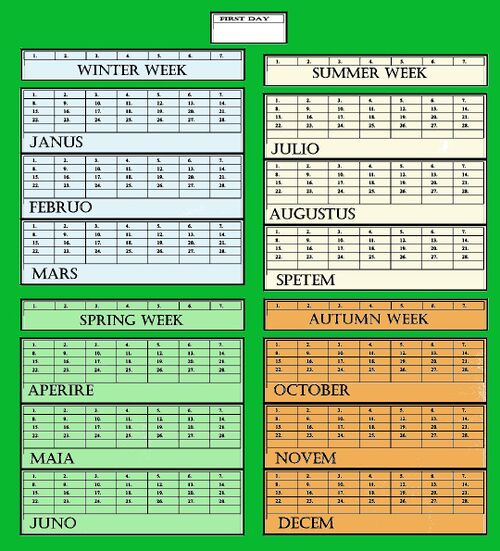Seasons and the Calendar of Amber
Seasons
The planet that the kingdom of Amber is on the one major body of land. There are several small Island chains. It has has 4 seasons: Spring, Summer, Autumn, and Winter. The winter tends to be mild except in the arctic regions which has a permanent ice cap. The Antarctic region has an occasionally occurring ice block that lasts a decade then melts.
Time
- Day Night Time: Amber has a 25 hour day. There are two 30 minute breaks between two 12 hour sets. A Nightbreak after the 12 pm and before 1 am. A Daybreak after 12 am and before 1 pm.
Calendar
The standard calendar of the Kingdom of Amber has 12 months of 28 days. Each month has 5 weeks of 7 days. At the beginning of each of the 4 seasons is a seasonal week of 7 days that belong to the season, but are separate from the months. There is a single stand-alone day at the beginning of the year called variably First Day, New Year's Day, Off Day, or King Finndo's Day.
- Birthdays of family members tend to be celebrated during the seasonal weeks even if a monthly date can be determined.
- The Winter months are Janus', Februo, & Mars. The Winter Week is The In Halls, and is celebrated with indoors festivities and arts and crafts, foods, gift giving, and sleeping. It is a week that often involved blacksmithing. The Third Day of WInter Week is called the King's Day and was a favorite of King Oberon's.
- The Spring Months Aperire, Maia, & Juno. The Spring Week is generally considered a week for intensive yearly cleaning. "Spring Cleaning"
- The Summer months are Julio, Augustus, & Spetem. The 7 day Summer Week is called Midway. It also features a large number of military festivals including ones sponsored by the CCC called the Sunbright.
- The Autumn months are October, Novem, Decem. The Autumn Week is the beginning of many harvest activities and festivals.
- First Day is a holiday of peace and is considered a day of truces where foes can safely gather. The day is called King Finndo's Day as a joke about King Finndo's reign the origins of which are nearlky forgotten.
